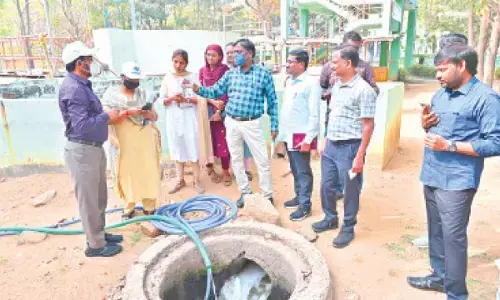Measure your weight before you over-weigh

Representational image
Obesity is the condition where a person’s Body Mass Index (BMI) is more than 30
Obesity is the condition where a person's Body Mass Index (BMI) is more than 30. It is global epidemic not only in developed countries but also in developing nations like India. Nearly one-third of the males and females in Hyderabad fall under obesity category as per latest survey. As per the survey, 30.1% women in the state are either overweight or obese, having a BMI of more than 25. In case of men, 32.3% are obese.
Obesity is a chronic & a progressive disease that can affect multiple organs in the body leading to great medical risk of disability or premature death. Overweight & obesity are the leading risks of global deaths with at least 2.8 million adults dying each year due to them.
Over abused eating habits, high consumption of junk food, lack of exercise & Genetics attribute to overweight. Food delivery apps and lack of playgrounds are further pushing up childhood obesity.
Healthy life style habits like daily physical activity, plant based foods, non-smoked foods; restricting high calorie diet will help in prevention of obesity.
Bariatric surgery helps in decrease the weight. It alters the digestive system & process to effectively decrease the weight
Types of Bariatric surgeries
Restrictive: Which decreases the part of food storage part of the body, thus decreasing the quantity of food intake?
Malabsorptive: Which causes of decreased absorption & metabolism of the food, thus causing weight loss
Combined: Combination of both
Here are some surgeries
• Sleeve Gastrectomy
• Gastric Bypass
• Mini Gastric Bypass
• Endoscopic Gastric Balloon
Benefits of Laparoscopic Bariatric Surgery
• Significant weight loss
• Improvement of diabetes type 2
• Lowers blood pressure
• Reduce incidence of joint paints
• Lower cholesterol
• Decreases gastric reflux
• Reduces Sleep apnea / Obstructive Sleep apnea
• Decreases scar
• Minimal post-operative pain
• Faster recovery
• Quicker return to activities
Risks & disadvantages:
• Anastomotic leaks, leading to infection
• Wound infection
• Hernias
• Gall stones due to rapid weight loss
• Blood clots
Life after surgery
People who underwent surgery require permanent changes to eating habits for a successful weight loss. They should follow strict surgeons' guidelines. Patients should periodically be checked for anemia & vitamin B12, folate & iron levels. Follow-up tests will be conducted every 3-6 months. Follow up is recommended for life.
We at Sravani hospitals perform all types of Bariatric surgeries with advanced Laparoscopic equipment. Equipped with Dietician, nursing care & Bariatric team.
(The author is a Consultant Surgical Gastroenterologist, HPB & Liver transplant Surgeon, Sravani Hospitals)

















